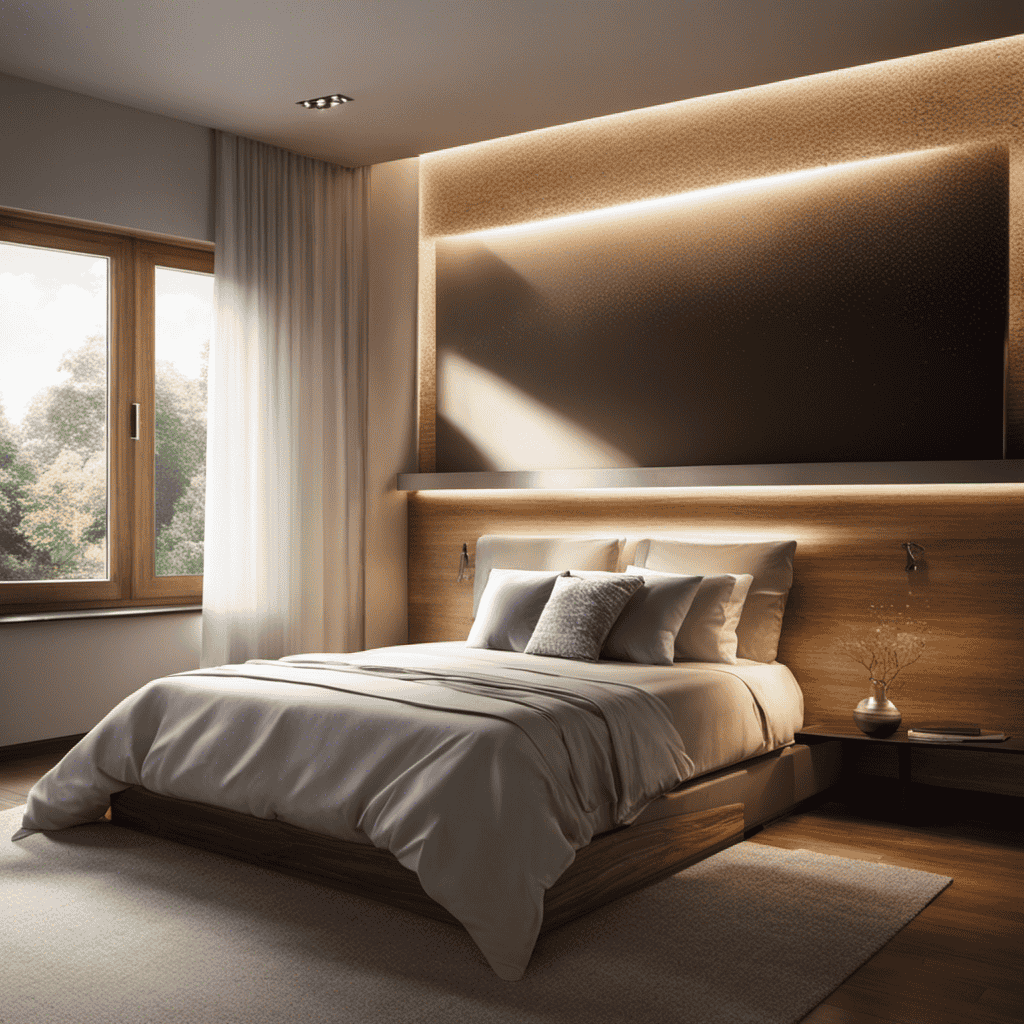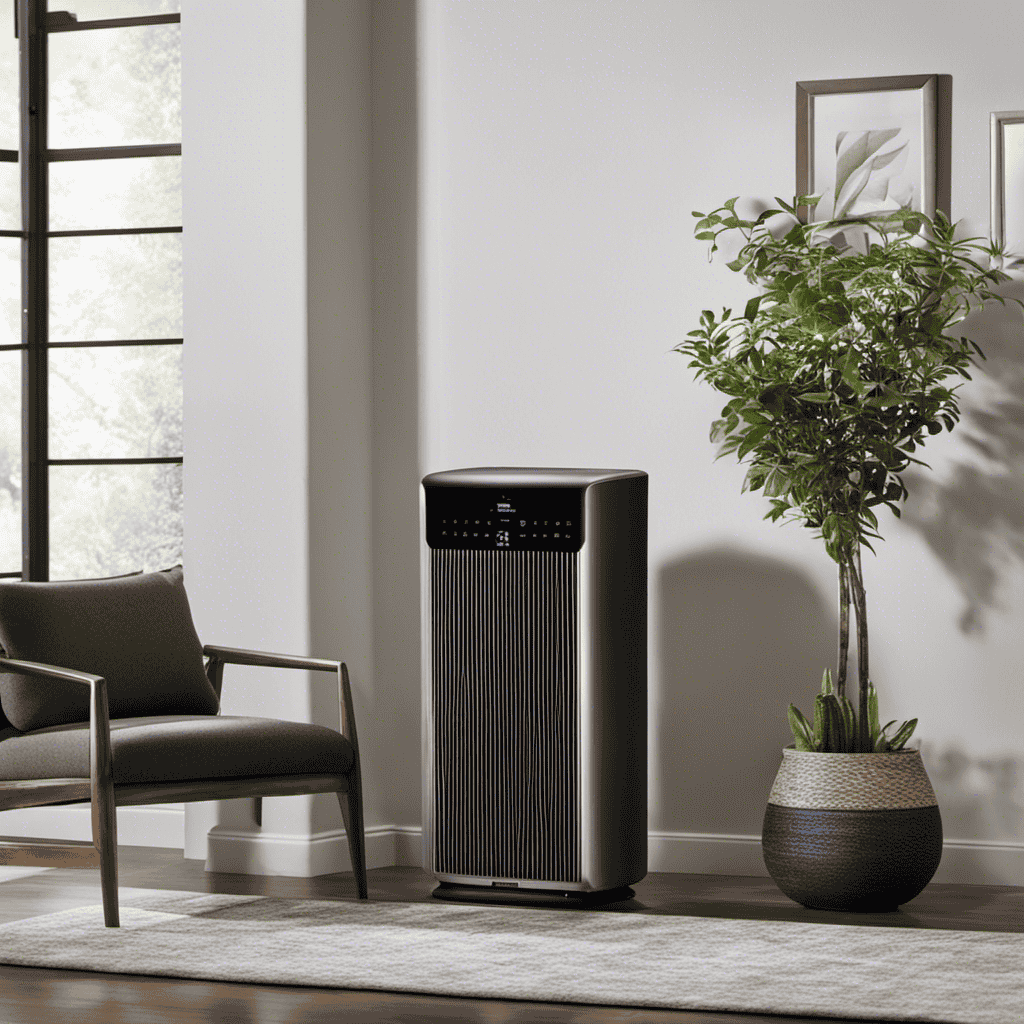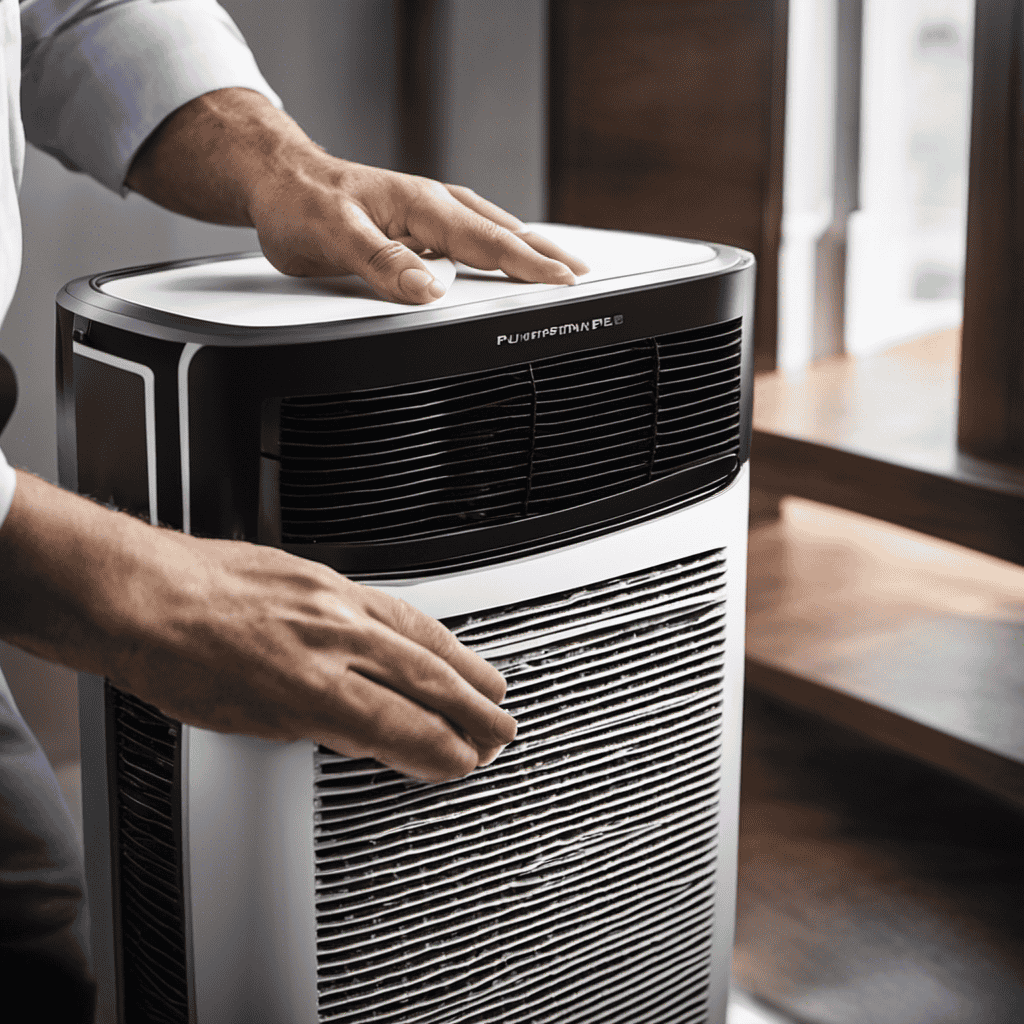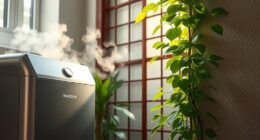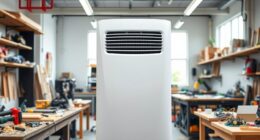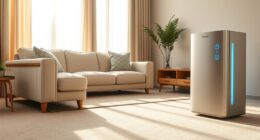As an individual who prioritizes the cleanliness and health of indoor air, I frequently contemplate the significance of an air purifier. Living in an environment teeming with pollutants and allergens, it’s essential to grasp the necessity of having these devices in our living spaces.
By actively filtering out harmful particles and improving air quality, air purifiers offer a multitude of benefits. From reducing allergies and asthma symptoms to eliminating odors and volatile organic compounds, these devices play a vital role in creating a safe and comfortable living environment.
Key Takeaways
- Air purifiers improve indoor air quality by removing harmful particles and reducing allergies and asthma symptoms.
- Common indoor air pollutants like tobacco smoke, pet dander, and mold can have negative effects on respiratory health and overall well-being.
- Choosing the right air purifier with HEPA and activated carbon filters is essential for reducing allergens and pollutants, as well as eliminating odors and smoke.
- Regular maintenance and care of air purifiers are important for optimal performance and longevity, ensuring a healthier home environment.
Health Benefits of Using an Air Purifier
Using an air purifier can help reduce allergies and asthma symptoms.
Air purifiers have numerous benefits, including improving air quality. These devices work by removing harmful particles, such as dust, pollen, pet dander, and mold spores, from the air.
This can be particularly beneficial for individuals with respiratory conditions like asthma or allergies. By eliminating these irritants, air purifiers help create a cleaner and healthier indoor environment.
Studies have shown that using air purifiers can lead to a decrease in symptoms such as coughing, sneezing, and wheezing. They can also improve sleep quality by reducing nighttime allergies.
Overall, air purifiers play a crucial role in improving air quality and promoting better respiratory health.
Common Indoor Air Pollutants and Their Effects
Indoor air pollutants can have adverse effects on our health and well-being. It is important to understand the sources of these pollutants and their effects in order to protect ourselves.
Common sources of indoor air pollutants include tobacco smoke, volatile organic compounds (VOCs) from cleaning products and building materials, pet dander, dust mites, pollen, and mold. Exposure to these pollutants can lead to various health issues such as respiratory problems, allergies, asthma, and even more serious conditions like lung cancer.
Furthermore, indoor air pollution can worsen existing health conditions and have a negative impact on our overall well-being. Therefore, it is crucial to take measures to improve indoor air quality and reduce the presence of these pollutants.
One effective way to achieve this is by using air purifiers, which can filter out harmful particles and contaminants, improving the air we breathe and promoting a healthier environment.
How Air Purifiers Improve Indoor Air Quality
When it comes to improving indoor air quality, air purifiers play a crucial role. These devices are designed to capture and remove particles like dust, pollen, pet dander, and mold spores from the air. This makes the air cleaner and healthier to breathe.
Air purifiers also have the ability to eliminate odors and smoke, creating a fresh and pleasant environment. By reducing the presence of these irritants and pollutants, air purifiers can greatly enhance overall respiratory health. This provides relief for those with allergies, asthma, or other respiratory conditions.
Reducing Allergens and Pollutants
To improve indoor air quality, it’s important to have an air purifier that effectively reduces allergens and pollutants. For pet owners, air purifiers with HEPA filters are highly recommended. These filters can capture pet dander, hair, and odors, helping to alleviate allergies and respiratory issues.
Additionally, activated carbon filters are beneficial for removing pet odors. When it comes to smokers, air purifiers equipped with both HEPA and activated carbon filters are essential. HEPA filters can trap harmful particles from cigarette smoke, such as tobacco smoke, while activated carbon filters can effectively eliminate the odors associated with smoking.
It’s important to choose an air purifier with a high Clean Air Delivery Rate (CADR) to ensure efficient and effective air purification. Remember, investing in the right air purifier can make a significant difference in reducing allergens and pollutants in your indoor environment.
Eliminating Odors and Smoke
Investing in an air purifier with activated carbon filters is essential for effectively eliminating odors and smoke. As someone who values a clean and healthy indoor environment, I understand the importance of having clean air to breathe.
Here are some benefits of using an air purifier with activated carbon filters:
-
Reduces unpleasant odors: Activated carbon filters are highly effective at trapping and neutralizing odors caused by cooking, pets, and other sources.
-
Removes smoke particles: Whether it’s from cigarettes or wildfires, an air purifier with activated carbon filters can help remove smoke particles and improve air quality.
-
Filters out volatile organic compounds (VOCs): These harmful chemicals can be released from cleaning products, paints, and furniture. Activated carbon filters can help remove these VOCs from the air.
-
Improves respiratory health: By eliminating odors and smoke, an air purifier with activated carbon filters can reduce respiratory irritation and improve overall lung health.
-
Enhances overall well-being: Breathing clean air has numerous benefits for our physical and mental health, including better sleep, increased energy levels, and improved concentration.
Investing in an air purifier with activated carbon filters is a worthwhile decision for anyone looking to improve their indoor environment and enjoy the benefits of clean air.
Enhancing Overall Respiratory Health
Improving the quality of your indoor air is essential for enhancing your overall respiratory health. The respiratory system is sensitive to pollutants in the air, and exposure to air pollution can have detrimental effects on our health.
Research has shown that long-term exposure to air pollutants, such as particulate matter, can lead to respiratory issues like asthma, bronchitis, and even lung cancer. Air pollution can also worsen existing respiratory conditions and increase the risk of respiratory infections.
To protect your respiratory health, it is crucial to minimize exposure to indoor air pollutants. Using an air purifier is an effective way to remove harmful particles, allergens, and pollutants from the air, ensuring cleaner and healthier indoor air for you and your family.
Allergies and Asthma Relief With Air Purifiers
Air purifiers play a crucial role in reducing allergens in indoor spaces, making them essential for those who suffer from allergies. These devices effectively remove airborne particles such as dust, pollen, pet dander, and mold spores, providing relief from common allergens that can trigger allergic reactions.
Moreover, air purifiers have been found to be beneficial for individuals with asthma, as they help remove asthma triggers like dust mites and volatile organic compounds, creating a healthier and safer environment for those with respiratory conditions.
Air Purifiers Reduce Allergens
By using an air purifier, you’ll notice a significant decrease in allergens floating around your home. Air purifiers are highly effective in removing various allergens from the air, providing numerous benefits for your health and overall well-being. Here are some reasons why air purifiers are so effective:
-
They capture airborne allergens such as pollen, dust mites, pet dander, and mold spores, preventing them from circulating in your home.
-
Air purifiers can reduce symptoms of allergies and asthma by removing triggers that often cause flare-ups.
-
They help improve indoor air quality by removing harmful pollutants such as smoke, VOCs, and bacteria.
-
Air purifiers can alleviate respiratory issues and promote better sleep by creating a cleaner and healthier environment.
-
They are particularly beneficial for individuals with sensitivities to allergens, providing relief from symptoms and improving overall comfort.
With their proven effectiveness and numerous benefits, investing in an air purifier is a wise decision to create a healthier and more comfortable home environment.
Asthma Benefits From Purifiers
When it comes to reducing asthma symptoms, a purifier can make a significant difference in your daily life. Asthma is a chronic respiratory condition that can be triggered by various factors, including poor air quality.
Air purifiers are designed to remove allergens and pollutants from the air, helping to improve indoor air quality and prevent asthma attacks. These devices use filters to capture particles such as dust, pollen, pet dander, and mold spores, which are common asthma triggers. By removing these irritants from the air, purifiers can help reduce the frequency and severity of asthma symptoms.
Studies have shown that using air purifiers in homes and workplaces can lead to improvements in lung function and a decrease in asthma-related symptoms. So, if you or a loved one suffers from asthma, investing in an air purifier can be a beneficial step towards asthma prevention and air quality improvement.
Eliminating Odors and Volatile Organic Compounds (VOCs
To effectively get rid of odors and VOCs in your home, you’ll want to use an air purifier. Not only does this device improve the indoor environment by reducing chemical exposure, but it also provides several other benefits:
-
Removes harmful pollutants: An air purifier can filter out allergens, such as pet dander and pollen, along with harmful chemicals like formaldehyde and benzene.
-
Neutralizes unpleasant odors: Whether it’s cooking smells, cigarette smoke, or pet odors, an air purifier can help eliminate these unpleasant odors from your home.
-
Reduces respiratory irritants: By removing airborne particles and irritants, an air purifier can alleviate symptoms of allergies, asthma, and other respiratory conditions.
-
Enhances sleep quality: Clean air promotes better sleep by reducing nighttime allergies and improving overall air quality in the bedroom.
-
Promotes overall well-being: Breathing clean air can improve cognitive function, boost energy levels, and reduce the risk of developing respiratory illnesses.
Choosing the Right Air Purifier for Your Home
Choosing the right air purifier for your home can be a daunting task. It is essential for maintaining a healthy indoor environment. With so many options available, it’s important to do your research and read air purifier reviews to make an informed decision.
A good buying guide can help you navigate through the different features and technologies that air purifiers offer. Look for purifiers that have a high Clean Air Delivery Rate (CADR), which indicates how efficiently they can filter the air. Consider your specific needs, such as allergies or asthma, and choose a purifier that targets those pollutants.
It’s also important to consider the size of the room you want to purify, as different purifiers are designed for different room sizes. By taking these factors into account and consulting air purifier reviews, you can find the right purifier to improve your indoor air quality.
Maintenance and Care Tips for Your Air Purifier
Maintaining and caring for your air purifier is crucial for ensuring its optimal performance and longevity. Here are some important air purifier maintenance and care tips to keep in mind:
- Regularly clean or replace the filters to ensure efficient air purification.
- Keep the air purifier in a well-ventilated area, away from obstructions.
- Clean the exterior of the air purifier with a soft cloth and mild detergent.
- Check and clean the fan blades to prevent dust build-up and maintain airflow.
- Schedule professional maintenance to inspect and service your air purifier annually.
By following these air purifier maintenance and care tips, you can ensure that your air purifier continues to provide clean and fresh air for you and your family.
Regular maintenance not only improves its performance but also extends its lifespan, ultimately saving you money in the long run.
Frequently Asked Questions
How Do Air Purifiers Work to Remove Pollutants From the Air?
Air purifiers work by using various mechanisms to remove pollutants from the air. These mechanisms, such as filters and ionizers, effectively capture and neutralize harmful particles, improving the overall air quality in your home or office.
Can Air Purifiers Help With Reducing the Spread of Airborne Viruses and Bacteria?
Air purifiers can help reduce the spread of airborne viruses and bacteria, complementing face masks. They provide added protection in schools and workplaces by effectively filtering out harmful particles, ensuring cleaner air for everyone.
Are There Any Potential Side Effects or Risks Associated With Using an Air Purifier?
There are potential side effects and risks associated with using an air purifier. It’s important to be aware of these, such as ozone emissions, noise pollution, and the need for regular maintenance.
Do Air Purifiers Require Any Special Installation or Can They Be Easily Set Up?
The installation process for air purifiers is usually straightforward and can be easily set up without any special requirements. However, it’s important to consider the maintenance requirements, such as filter replacements, to ensure optimal performance.
Can Air Purifiers Be Used in Large Spaces or Are They Only Effective in Small Rooms?
Air purifiers are not limited to small rooms; they can be used in large spaces as well. They are especially beneficial for commercial use, as they effectively remove pollutants and improve indoor air quality.
Conclusion
In conclusion, using an air purifier is essential for maintaining a healthy indoor environment. It helps eliminate common pollutants, such as dust, pollen, and pet dander, which can trigger allergies and asthma.
Additionally, air purifiers remove odors and volatile organic compounds, improving the overall air quality in your home.
So why compromise on your health when you can breathe clean, purified air? Isn’t it time to invest in an air purifier and prioritize your well-being?
